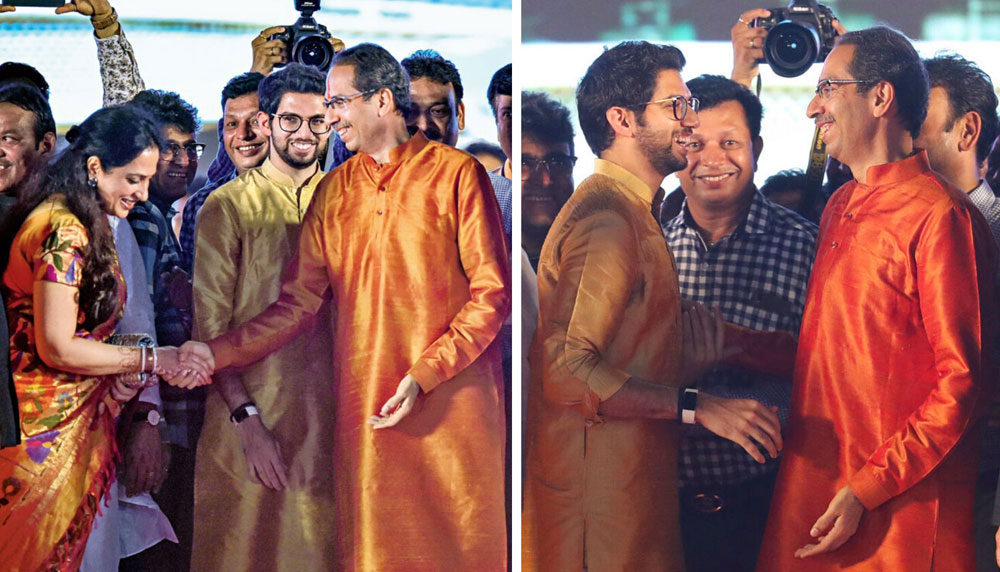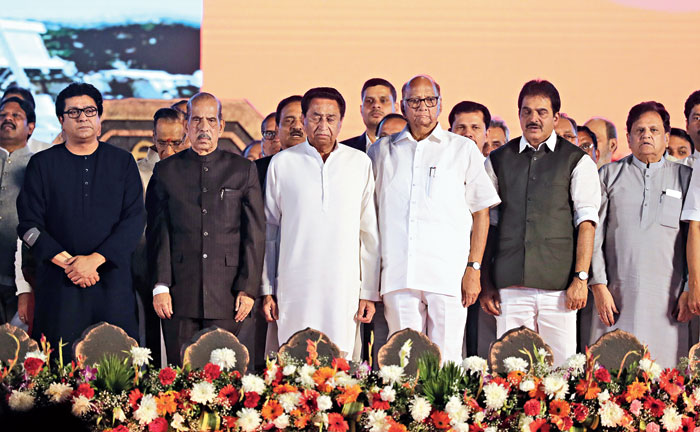Soon after dusk fell, Maharashtra, if not the whole of India itself, witnessed a political dawn that would have astonished even Bismarck who took bewilderment out of politics by calling it 'the art of the possible'.
The milestone moment was not in an occupant of Matoshree, in the shape of Uddhav Thackeray, swapping the remote-control for public office accountable to the Constitution of India but in the very first sentence of the common minimum programme of the Shiv Sena-NCP-Congress government.
'The alliance partners commit to uphold the secular values enshrined in the Constitution,' read the opening line of the common minimum programme under a somewhat presumptuous sub-head 'Preamble'.
In the age of cynicism, the statement of intent can be laughed off as a politically correct platitude that has no relevance in 'New India'. But, for the Shiv Sena, once the symbol of regional as well as religious chauvinism, the sentence would have been as politically incorrect as it could have got even a few years ago.

Uddhav and his wife Rashmi shake hands, son Aaditya congratulates Uddhav PTI, AP
The reference to the much-maligned S-word was by no means an isolated afterthought. The word made its presence felt in the next sentence, too: 'On contentious issue of national importance as well as of state importance, especially having repercussions/consequences on the secular fabric of the nation, the Shiv Sena, the NCP and the Congress will take a joint view after holding consultations and arriving at a consensus.'
Two 'secular' swallows do not a summer make and many things can still go wrong on the treacherous terrain of power politics, especially with a leviathan-like Modi-Shah regime breathing down the neck of the fledgling coalition.
But it is still a remarkable moment in Indian politics and a reminder of the opportunity Narendra Modi and Amit Shah missed - not once but twice the nation gifted them astounding mandates - to reinvent and recast the BJP as a party for every Indian.
The unique - and inconceivable - alliance of contradictions in Maharashtra came into being largely because of the domineering ascendance of the BJP that might have threatened the existence of ideological sweetheart Shiv Sena, which was the bigger partner in Maharashtra for so many decades.
The bitter separation with the oldest ally, followed by a nasty bout of political intrigue that saw a fake government installed for a while, led to a coalition of disparate forces.
Although the absence of Sonia Gandhi and Rahul Gandhi from the ceremony was viewed as a sign of ideological diffidence, both wrote to Uddhav, effusively wishing him success.
Sonia's letter clearly indicated that she had overcome the mental block to whole-heartedly support the exceptional political venture.
She said: 'The Shiv Sena, NCP and the Congress have come together under extraordinary circumstances at a time when the country faces unprecedented threats from the BJP. The political atmosphere has become poisonous and the economy has collapsed and farmers are facing great distress.'
She added: 'The Shiv Sena, NCP and the Congress have agreed to a common minimum programme and I am confident that all three parties will strive their utmost to implement that programme in letter and spirit. The people of Maharashtra expect the alliance to provide cohesive, purposeful, responsible, responsive and transparent administration and our collective effort will undoubtedly be to ensure that these expectations are fulfilled.'
Adding a personal touch, she wrote: 'Aaditya met me yesterday and extended your kind invitation to attend the swearing-in ceremony in Mumbai. I regret that I am not able to be present at the function. I wish you personally all the very best as you embark on a new innings in your life.' Aaditya is Uddhav's elder son.
Rahul, who was thought to have serious reservations to this odious approximation of diverse political philosophies, offered his 'best wishes' and wrote: 'The events leading up to the government formation in Maharashtra have set a dangerous precedent for our democracy. I am glad that the Maharashtra Vikas Aghadi has come together to defeat the BJP's attempt to undermine our democracy. The people of Maharashtra have high expectations from the coalition and I am confident it will provide them a stable, secular and pro-poor government.'

Sharad Pawar (centre), the key architect of the alliance, at the swearing-in with (from left) Uddhav’s cousin Raj Thackeray, former chief minister Manohar Joshi, Madhya Pradesh chief minister Kamal Nath and Congress leaders KC Venugopal and Ahmed Patel. AP
Former Prime Minister Manmohan Singh also sent his good wishes.
The Congress expressed full solidarity with Uddhav by sending a strong team to the oath-taking ceremony, which included Ahmed Patel, Kamal Nath, Mallikarjun Kharge, K.C. Venugopal, Kapil Sibal, Abhishek Singhvi and all senior local leaders.
Among the others to attend the event were Sharad Pawar - the key architect and saviour of the coalition - DMK's M.K. Stalin, industrialist Mukesh Ambani and former chief minister Devendra Fadnavis.
Those who took oath along with the chief minister were Sena's Eknath Shinde and Subhash Desai, Jayant Patil and Chhagan Bhujbal from NCP and Balasaheb Thorat and Nitin Raut of the Congress.
Although Uddhav does not have any past involvement in governance, these six are veterans, having decades of political and administrative experience. Along with others like Ajit Pawar, Nawab Mallik, Nana Patole, Ashok Chavan and Prithviraj Chavan, Uddhav will probably have a stronger team any other state can dream of.
All the allies have taken care not to start on a sour note and that's why Ajit Pawar, who was first sworn in as deputy chief minister along with Fadnavis, was not included in the list on Thursday.
Sharad Pawar knew Ajit's presence might overshadow the Uddhav story and hence kept him waiting for the expansion a little later.
Uddhav was reluctant to take the mantle initially but both Sonia and Pawar felt his leadership would lend heft and gravitas to the government, compelling him to lead from the front.
The Thackeray family that was often accused of using remote-control to pull the strings of power will now have the direct responsibility to deliver and showcase its administrative skills. Being in power, which imposes constitutional constraints on the leaders, is bound to force the Sena to moderate its political outlook.
Born on July 27, 1960, Uddhav graduated in arts and took up wildlife photography. An accomplished photographer, he has held several photo exhibitions in Mumbai and elsewhere before getting engrossed in politics.
The mild-mannered Uddhav was never seen as the natural heir to Bal Thackeray's legacy and political observers chose to portray his cousin Raj as Sena's future. When Uddhav was finally made the chief of Shiv Sena in 2004, a development that led his cousin's exit in 2006, most pundits wantonly wrote Sena's obituary.
But the reluctant politician Uddhav carved out his own politics by moderating the Sena agenda, irrespective of the enduring violent activism of Raj Thackeray against outsiders, and established his control over the party.
Although the BJP's resurgence threatened Sena's existence, Uddhav has now taken a bold step to create a much greater opportunity for his party for renewal and expansion in the coming years. If he performs well, Sena will be in a position to occupy much of the political space in the state at the cost of all the three parties - the Congress, NCP and the BJP.










